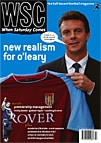 No promotion for Falkirk equals no interest for the fans, believes Dianne Millen, at a time when Scottish football can ill afford to be encouraging stagnation
No promotion for Falkirk equals no interest for the fans, believes Dianne Millen, at a time when Scottish football can ill afford to be encouraging stagnation
“Have fun in Division One” was the visiting fans’ chant at Fir Park a few weeks ago: but despite the ritual abuse, it won’t be SPL bottom club Motherwell going down after all. Instead, champions Falkirk will stay in the Bell’s First Division next season, after their application to the Premier League was, as widely predicted, rejected by seven of the 12 clubs on May 23.
Since Falkirk’s new ground, which would meet the 10,000-seat requirement for Premier League status, remains but a twinkle in an architect’s eye, they gambled on an interim groundshare. However, they failed to convince the SPL that they would be guaranteed priority use of the stadium. The “bitterly disappointed” Bairns are now fighting back with an appeal strategy involving everyone from the Office of Fair Trading to the Scottish Parliament, backed by a newly formed supporters’ trust.
However, not everyone is sympathetic. Clubs such as St Mirren, St Johnstone, Clyde and Partick Thistle, all of whom risked ruin to make the investment in their stadiums required to meet the SPL’s criteria, contend that Falkirk opted to spend on the team rather than the ground in full knowledge of the rules.
Although the rules were presumably applied correctly, the whole affair has inflicted serious damage on the SPL’s already supermodel-thin credibility. And in all but Motherwell’s case – they are already in administration and would probably not have survived the drop – the violation of the fundamental principle of relegation and promotion can only aggravate the long-term financial problems facing the Scottish game. The 12 SPL clubs are in a financially vulnerable state – in contrast to Falkirk, who are breaking even.
Last year’s PricewaterhouseCoopers annual review showed that during season 2000-01 the combined net debt rose from £55 million to £132m. By last October, the total debt of the seven no-saying clubs alone was a nerve-shredding £116m. It’s not surprising that they are all – even Rangers, allegedly £80m in the red – cutting back and the prospect of another club following Motherwell into administration is very real.
Although this shambles is primarily due to clubs paying stupidly high wages, under the circumstances it would make more sense for the authorities to do everything possible to maximise the one area of competition left in Scottish football. They delayed the Falkirk decision to try to give the last few games some sting, but few fans were taken in: an unfortunate situation given that the “relegation” battle this year involved five teams and could have been far more exciting than the same old two-club title race if the outcome had ever been in genuine doubt.
It is real competition, not half-time cheerleaders, patronising pundits or gourmet pies, which creates and sustains interest in football. Since the authorities are unwilling to take radical measures such as salary-capping or league-restructuring, and the southward departure of the Old Firm remains unlikely, this means they must ensure that relegation functions properly. Otherwise, the downward trend in attendances could tip the SPL clubs’ balance sheets from farce into tragedy.
The consequences for the clubs outside the top division, whose finances are no healthier, could be even worse. If there is no prospect of promotion, what is the incentive for them to develop, or for their fans to turn up? Clubs’ prospects for income generation and therefore investment in players would be drastically reduced, with implications for the national side, whose coach Berti Vogts has already criticised the opportunities for young players. While these regulations remain in force and are administered so ineptly, there is a real chance of another club over-reaching itself just as Airdrie did a year ago – ironically, the now-defunct club’s New Broomfield is the very stadium Falkirk sought to share.
But perhaps the saddest part of the whole affair is that most of the 10,000-seat grounds in the SPL are never filled to capacity anyway. Given the precarious state of the game, unless the authorities get the basics right in future seasons, there is a real risk that a club may go out of business – ultimately for the sake of a few thousand garishly-coloured, empty plastic seats. Having fun in Division One just got harder.
From WSC 197 July 2003. What was happening this month